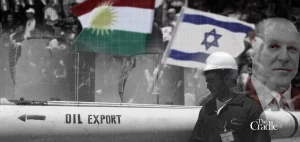Israel’s notorious intelligence agency has spent decades infiltrating and sabotaging Arab states. But it has hit a wall in Iraq, a country that hosts the Axis of Resistance and is prepared to fight back hard.

Just before midnight on 15 January, Erbil, the capital of Iraqi Kurdistan, was rocked by a targeted missile attack by Iran’s Islamic Revolutionary Guard Corps (IRGC). Eleven Fateh 110 ballistic missiles homed in on the private residence of the affluent and connected Kurdish tycoon Peshraw Dizayee, aged 61, who was killed along with members of his family and a fellow business associate.
The IRGC said in a statement that it hit “one of the main headquarters of the Israeli Mossad in the Kurdistan region of Iraq,” noting that this action was in response to the occupation state’s assassination of leaders within the IRGC and its Axis of Resistance.
“We assure our nation that the Guards’ offensive operations will continue until avenging the last drops of martyrs’ blood,” the IRGC said.
This military strike has roots in the recent assassinations of several IRGC members in Syria, including a high-ranking commander, to which Tehran promised to retaliate. The IRGC also struck ISIS positions in Syria’s restive Idlib province.

Covert oil connections
Dizayee, a man of influence with deep connections to Iraqi-Kurdistan’s ruling Barzani clan and the Kurdistan Democratic Party (KDP), had an estimated wealth of $2.5 billion from founding the Falcon Group, which engaged in diverse sectors including security, oil, gas, construction, and agriculture.
His pivotal role in facilitating oil exports from Kurdistan to Israel drew attention to his intricate, but illegal ties with Tel Aviv, in addition to the Kurdish security and intelligence apparatus.
Despite Iraqi laws explicitly forbidding any dealings with Israel, reports and experts suggest that a significant portion of Israel’s oil imports — approximately 70 percent, by some accounts —originates from Iraq’s Kurdistan region, at prices 50 percent lower than market values.
Iraq exports about 3.6 million barrels of oil per day, including 390,000 barrels from oil fields in the Kurdistan region, through the 970-km northern pipeline that stretches from Kirkuk to the Turkish port of Ceyhan, before making its way to Israel.
In 2014, with ISIS taking control of Mosul and large swathes across Iraq, the Kurdistan Regional Government (KRG) began directly exporting crude oil to Turkiye and selling it on the international markets without going through Baghdad’s State Organization for Marketing of Oil (SOMO) company responsible for all Iraqi oil exports.
Iraqi lawmaker Uday Awad tells The Cradle that these direct oil sales were both illegal and secretive:
“For years, the Kurdistan region tried to hide oil sales to Tel Aviv, but all shipments to Israeli ports are documented by SOMO which tracked every barrel sold to Israel.”
On 17 February, 2022, the Iraqi Federal Supreme Court ruled that the Kurdistan government’s approval of the oil and gas law in the region was unconstitutional, basing its decision on the KRG’s admission in 2015 — before the US Court of Appeals in a lawsuit filed by Iraq — of unloading oil shipments in Israeli ports.
Israeli influence and intrigue in Iraq
Dizayee’s expansive Falcon Group conglomerate has become a focal point in the Iraq-Israel nexus. Iranian media alleges a web of connections, including EIA, a company purportedly affiliated with the US Census Bureau, nestled within the US Department of Commerce.
Of particular concern is Falcon Security Company, a subsidiary believed to employ around 600 individuals, primarily former military personnel from the US Army. Speculation swirls that this security arm maintains direct ties with the US Defense Intelligence Agency (DIA), serving as a conduit for valuable information gathering on Iraq’s internal affairs.
Speaking on condition of anonymity to The Cradle, Iranian sources claim that Dizayee was a Mossad collaborator in Erbil, orchestrating covert operations and providing logistical support through his vast business empire.
Private Iraqi sources corroborate this narrative, and say an intricate Israeli influence network has entrenched itself in Kurdistan, with the Mossad allegedly training groups antagonistic to Iran and the Axis of Resistance.
Importantly, the focus of these groups reportedly encompasses security operations, including the targeted assassination of scientists engaged in Iran’s nuclear program.
Over the past decades, the Israeli Mossad has persistently worked to establish spy cells across Arab states — whether hostile or friendly — but has continually encountered resistance in Iraq. Notable instances include the case of Ezra Naji Zalka, an Iraqi Jew, whose spy network faced exposure by Iraqi intelligence, leading to their execution in 1969.
The Mossad, however, received a boost in Iraq facilitated by the illegal 2003 US invasion of the country. The American occupation opened a new chapter for Israel’s espionage and sabotage activities, in which it targeted Iraq’s northern regions to create a strategic vantage point against neighboring countries, particularly Iran.
Mossad objectives extend beyond mere intelligence gathering: Its focus encompasses collecting information on military sites, security installations, and potential threats posed by countries resistant to Tel Aviv’s interests.
Economic espionage became a key facet, with the Mossad seeking data on investment projects, tourism, agriculture, stock exchanges, and influential businessmen in targeted states.
The scope broadened further with the Mossad’s notoriously engagement in subversive activities, influencing societal values and norms. Accusations range from drug proliferation to the sponsorship of international prostitution networks and involvement in the slave trade.
Resistance to Zionism and Israeli espionage
Equipped with cutting-edge technology, the Israeli intel agency strives not only to identify the whereabouts of resistance leaders but also to manipulate public sentiment in its pursuit of broader geopolitical objectives.
Iraqi intelligence services have historically thwarted many of the Israeli penetration activities, particularly in the formation of spy cells in the center and south of the country.
One such instance was the cell established by Ezra Naji Zalka, an Iraqi Jew who was able to recruit many spies to work for Israel. According to Iraqi government data, there were, at one time, 35 spies in the Zalkha network, including 13 Jews who were identified and captured by Iraqi intelligence.
Zalkha’s main task at the beginning of his tenure with the Mossad was to collect information about poor Jews in popular neighborhoods, their living conditions, numbers, education, and attitudes on the issue of immigration. His cell later expanded its work to include military and security dimensions and began collecting information on Iraqi institutions.
According to memoirs published last year by Israeli-British historian and Iraqi Jew Avi Shlaim, between 1950 and 1951, the Mossad was linked to five bomb attacks on Jewish targets in an operation known as Ali Baba.
The purpose was to instill fear amongst and hostility toward Iraqi Jews from the wider public. This would lead to over 120,000 Jews — at the time, 95 percent of the Jewish population in Iraq — being airlifted to Israel in a mission known as Operation Ezra and Nehemiah.
Mossad’s subversive tactics are thus a security threat to all West Asian states, with the recent flurry of normalization agreements effectively installing a Trojan horse for Zionism.
The offer on the table is not for peace; it is a do-or-die threat: those states resistant to normalization face increased acts of terrorism, sabotage, or assassination — and, as a punishing last resort for those unwilling to fall in line, conventional air strikes by the US-backed Israeli military, or the US itself.
By The Cradle Iraq Correspondent
Published by The Cradle
Republished by The 21st Century
The views expressed in this article are solely those of the author and do not necessarily reflect the opinions of 21cir.com
